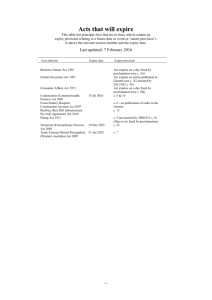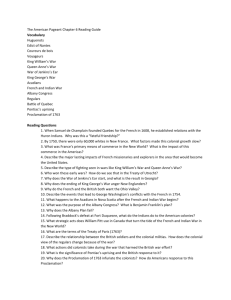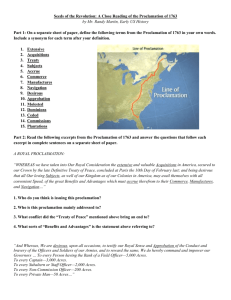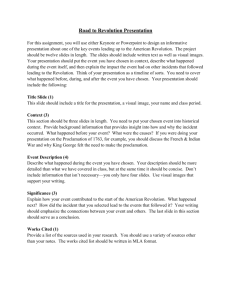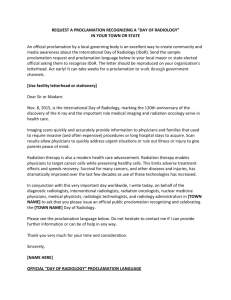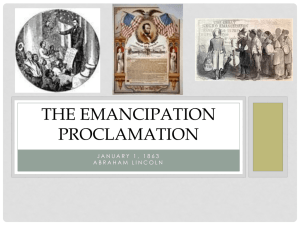Study Days on The Salesian Mission and the Initial Proclamation of
advertisement
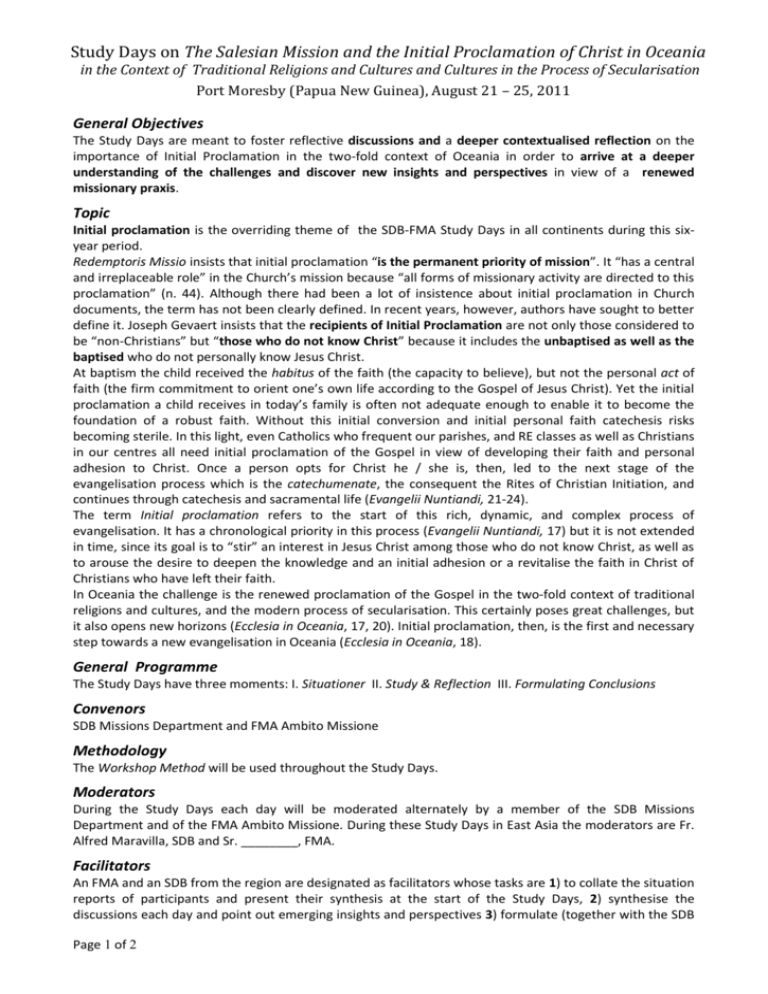
Study Days on The Salesian Mission and the Initial Proclamation of Christ in Oceania in the Context of Traditional Religions and Cultures and Cultures in the Process of Secularisation Port Moresby (Papua New Guinea), August 21 – 25, 2011 General Objectives The Study Days are meant to foster reflective discussions and a deeper contextualised reflection on the importance of Initial Proclamation in the two-fold context of Oceania in order to arrive at a deeper understanding of the challenges and discover new insights and perspectives in view of a renewed missionary praxis. Topic Initial proclamation is the overriding theme of the SDB-FMA Study Days in all continents during this sixyear period. Redemptoris Missio insists that initial proclamation “is the permanent priority of mission”. It “has a central and irreplaceable role” in the Church’s mission because “all forms of missionary activity are directed to this proclamation” (n. 44). Although there had been a lot of insistence about initial proclamation in Church documents, the term has not been clearly defined. In recent years, however, authors have sought to better define it. Joseph Gevaert insists that the recipients of Initial Proclamation are not only those considered to be “non-Christians” but “those who do not know Christ” because it includes the unbaptised as well as the baptised who do not personally know Jesus Christ. At baptism the child received the habitus of the faith (the capacity to believe), but not the personal act of faith (the firm commitment to orient one’s own life according to the Gospel of Jesus Christ). Yet the initial proclamation a child receives in today’s family is often not adequate enough to enable it to become the foundation of a robust faith. Without this initial conversion and initial personal faith catechesis risks becoming sterile. In this light, even Catholics who frequent our parishes, and RE classes as well as Christians in our centres all need initial proclamation of the Gospel in view of developing their faith and personal adhesion to Christ. Once a person opts for Christ he / she is, then, led to the next stage of the evangelisation process which is the catechumenate, the consequent the Rites of Christian Initiation, and continues through catechesis and sacramental life (Evangelii Nuntiandi, 21-24). The term Initial proclamation refers to the start of this rich, dynamic, and complex process of evangelisation. It has a chronological priority in this process (Evangelii Nuntiandi, 17) but it is not extended in time, since its goal is to “stir” an interest in Jesus Christ among those who do not know Christ, as well as to arouse the desire to deepen the knowledge and an initial adhesion or a revitalise the faith in Christ of Christians who have left their faith. In Oceania the challenge is the renewed proclamation of the Gospel in the two-fold context of traditional religions and cultures, and the modern process of secularisation. This certainly poses great challenges, but it also opens new horizons (Ecclesia in Oceania, 17, 20). Initial proclamation, then, is the first and necessary step towards a new evangelisation in Oceania (Ecclesia in Oceania, 18). General Programme The Study Days have three moments: I. Situationer II. Study & Reflection III. Formulating Conclusions Convenors SDB Missions Department and FMA Ambito Missione Methodology The Workshop Method will be used throughout the Study Days. Moderators During the Study Days each day will be moderated alternately by a member of the SDB Missions Department and of the FMA Ambito Missione. During these Study Days in East Asia the moderators are Fr. Alfred Maravilla, SDB and Sr. ________, FMA. Facilitators An FMA and an SDB from the region are designated as facilitators whose tasks are 1) to collate the situation reports of participants and present their synthesis at the start of the Study Days, 2) synthesise the discussions each day and point out emerging insights and perspectives 3) formulate (together with the SDB Page 1 of 2 Study Days on The Salesian Mission and the Initial Proclamation of Christ in Oceania in the Context of Traditional Religions and Cultures and Cultures in the Process of Secularisation Port Moresby (Papua New Guinea), August 21 – 25, 2011 & FMA Missions Department team) a final synthesis of the whole Study Days outlining the challenges as well as new missiological and theological insights and perspectives regarding Initial Proclamation in Oceania. During these Study Days the facilitators are Sr. Pamela Vecina, FMA and Fr. John Cabrido, SDB. Speakers The speakers are chosen outside the Salesian Family circle in order to hear a ‘different voice’ regarding the topic and help the participants to ‘think out of the box’. The speakers are asked to give a talk on a specific topic in order provoke a deeper reflection and analysis of the situation and help participants discover new insights and perspectives. Talks I. «Initial Proclamation in the Context of Traditional Religions and Cultures of Melanesia and Polynesia» - Speaker: Fr. Franco Zocca, SVD Melanesian Institute, Goroka, PNG (Backgrounder for the Speaker: SDBs, FMAs and the Salesian Family work in context where traditional religions and cultures play an important role in the lives of people. The challenge is how to make an inculturated initial proclamation in these contexts). II. «Initial Proclamation in Societies in the Process of Secularisation» - Speaker: (Backgrounder for the Speaker: Although Australian and New Zealand societies are considered to be in the process of secularisation, due to globalisation and migration this process is also being felt, in different degrees, in urban centres of other countries (Ecclesia in Oceania, 7). The challenge is discover the positive elements of secularisation and use these as launching pads for an initial proclamation in these contexts) III. «From Initial Proclamation to Christian Initiation» - Speaker: (Backgrounder for the Speaker: After an initial proclamation in the two-fold contexts in Oceania and an option for Christ is made, the crucial link to the evangelisation process is the catechumenate, the consequent the Rites of Christian Initiation and catechesis. The challenge is how to accompany the “convert” through this process) Reaction to Speakers After the talk one of the participants will respond in a form of a critical reaction to the talk outlining its possible challenges and opportunities from the Salesian perspective. The one who will give the reaction will have received the talk and studied it well in advance. This reaction (a printed copy is also provided) is meant to stimulate further discussion and deeper reflection but it should not exceed 20 minutes. Participants The Study Days are directed to those with a certain level of theological and / or missiological and / or anthropological and / or academic formation. This is NOT a formation seminar for missionaries. Expectations From the Participants Participants are expected to do some preparatory research and reflection regarding the topic. They are asked 1) to respond to a questionnaire which must be sent to the coordinators on or before May 30, 2010 2) to study the talks 3) participate actively in the group sharing in view of arriving at a deeper understanding of the challenges and discover new insights and perspectives. Group Discussions Each day there are group discussions on open‐ended questions to give the participants opportunities to express their thoughts and feelings from different angles based on their specific situations. These, in turn, are a source of a wealth of information and deep insights which are crucial during these Study Days. After the Study Days The acts of the Study Days are published in booklet form (in different languages) with different modules which would enable the local communities (even those in other contexts of the Congregation) to use the materials for the on-going formation of the members of the local communities. Page 2 of 2

